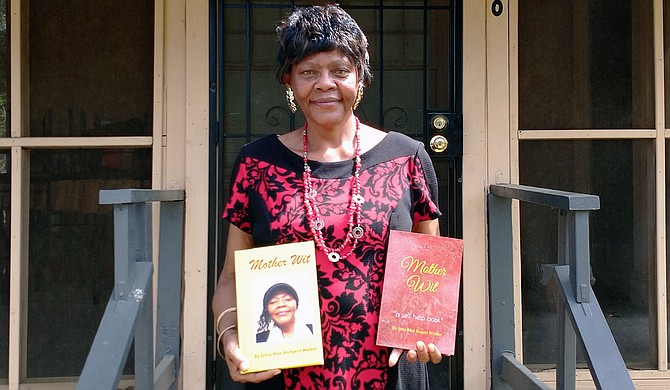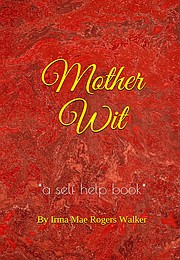Long-time Jackson resident Irma Mae Rogers relays the life lessons she has learned from her experiences with being a young mother in her book, “Mother Wit,” which is available in both hardcover (left) and softcover (right). Photo courtesy Irma Mae Rogers
Born in rural Sharkey County, Irma Mae Rogers—author of the recently released book "Mother Wit"—moved to Jackson, Miss., as a young child. Rogers became a mother at the age of 15, and she shares the lessons she learned along her journey (many of them the hard way) in her book, which local editor Meredith McGee published.
Q
You talk briefly in the book about your childhood. Could you talk a little bit about how those experiences formed the ideas you discuss in "Mother Wit"?
A
I'm the eighth of my parents' children. We're all about 11 months apart, and my older sisters and I helped my mom out. When we lived in Sharkey County, my brothers were out in the cotton fields, but we moved to Jackson when I was about 4. We lived in temporary housing for a while, and I knew how to see after a baby by the time I was 5. I was a mother for most of my childhood because I kept my siblings (who were) younger than me. I mostly stayed home (during that time). I'm very observant and quiet, but I pick up on things, so I was always watching and paying attention. My dad left when I was 6 or 7, and I was 15 when I had my first child.
Q
You discuss how you later felt led to forgive your father. What helped you see the importance of forgiveness in that particular relationship?
A I don't know what the man was thinking, to be honest. We were already poor, but when I looked back, I thought that maybe his parents didn't do a good job. He saw something like that (abandonment) growing up: have a woman with a lot of kids and leave. He was getting out of all that noise—it was all of us in one house. So it helped me understand (what he was thinking), and it helped me raise my own kids.
Q
Could you talk about what your experience with young motherhood was like?
A
(Becoming a young mother) was my fault, so I said, "I'm not gonna give him up." I did what I had to do, and my baby is 48 now. We're only 15 years apart, but I had a strong determination to hang in there with my kids. We played games and did puzzles, and I got up in the morning and got them ready for school. I got a GED when I was 17. My son was 2 (at the time), but I never stopped classes. I went every year. My health tried to keep me down, but I kept going. When my son got up into middle and high school, he would help me with my homework. I wasn't ashamed; I wanted to learn. Those children saved me—they kept me out of the streets.
Q
If you had to pick one topic from your book for the young people of today to read, which would it be and why?
A
I would pick the chapter on family and relationships. It's got a lot in it, and it's got my most important points. Family relationships start with the parents. A lot of families have a lot of complications, and there are dysfunctional families in the world today. I see a lot of that. The parents are how it got like that—the parents' parents' parents. Kids started having kids, but parents have to train kids. Every child should have a job, and families should get acquainted and talk more. They should get off their chests what they're keeping in their minds.
Q
Yes, you touch on the idea of families sharing more in "Mother Wit," especially regarding mental health. Why is that an important topic in today's society?
A
A lot of people throw their hands up on mental health, and a lot of people don't talk about it. My daughter was born with schizophrenia. She is disabled, and she was slow to develop. I was like a caretaker: I made sure everybody got to school, and I made sure everybody got to their doctor's appointments. I care about my daughter, and I love her, and people should feel like they can talk about (mental health) more.
Q
Near the end of the book, you ask, "Who is responsible for a young girl's future?" How would you answer that question?
A
Her parents are partly responsible—a baby doesn't know anything when it comes into the world. They learn how to do everything, and the parents have to teach them. It's layered, and it's a hard job. A lot of people don't have patience for that, but it's not the kid's fault. But in the end, you've got to be able to go out on your own.
It's hard, it's expensive. It's why you need to finish high school and go to college: 18 isn't ready; 21 isn't ready. Take your time, and you'll have a home when you get finished, and you won't wind up in these streets. When I think of a young girl's future, I think of my future. I was 50 when everyone had moved out, and I finally got my own apartment, but I'm still trying to go to school and still trying to go to work.
Readers interested in learning more about Rogers's book can visit her blog at https://meredithetc.com/mother-wit. Copies of "Mother Wit" may be purchased directly from the publisher (Meredith Etc) or from Barnes and Noble's online selection.



